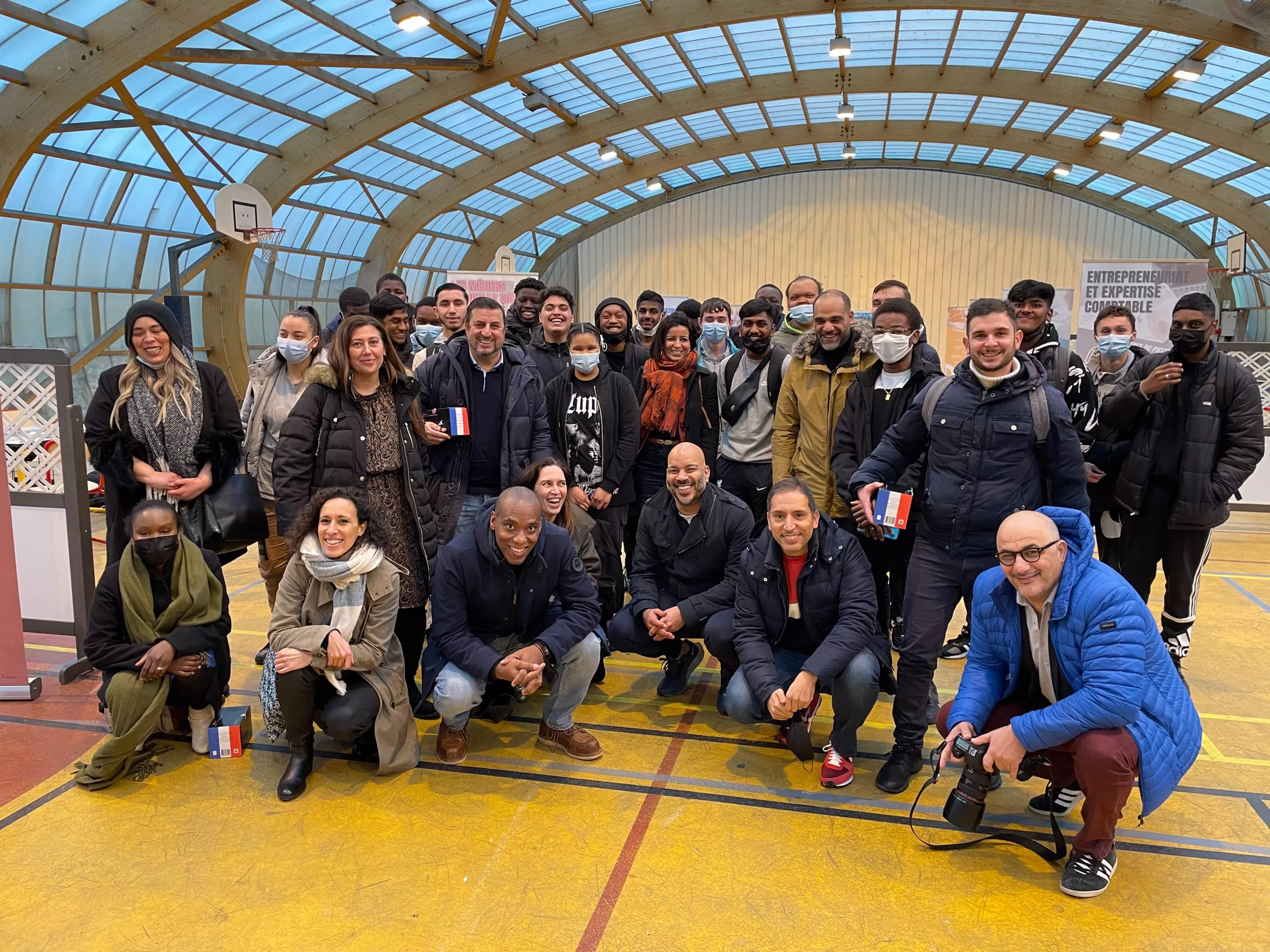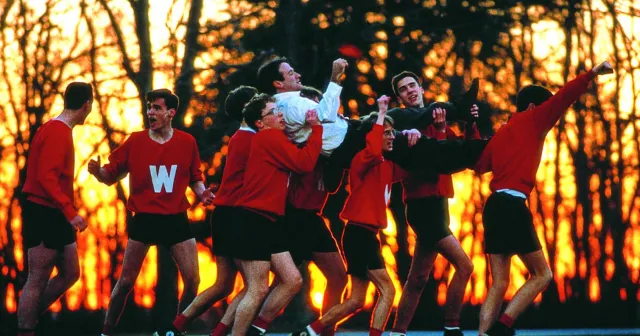Graines de France, an initiative improving relations between the general public and the institutions.

Following the “riots” in the summer of 2023, relations between the general public, and especially young people, in neighbourhoods experiencing social and economic difficulties and the government institutions (police, firefighters, schools, etc.) have become strained. We all remember the incomprehension at seeing schools being burnt down, public buildings ransacked and firefighters put at risk. Some young people have a strong feeling of being sidelined, misunderstood or even despised by society.
But there are some initiatives aimed at reducing this social divide. “Graines de France” is one of them.
I met with Reda Didi, the founder of Graines de France. He has carried out a number of research projects on “otherness, racism and xenophobia during the 2012 campaigns” and on “improving reception and integration in France”, with the Fondation Jean Jaurès. He has also been a member of the political council responsible for initiatives aimed at improving the integration of people from migrant backgrounds or living in suburban areas.
https://www.jean-jaures.org/wp-content/uploads/drupal_fjj/publication-print/rapport-integration.pdf
David Lopez: Reda, can you tell us about the objectives of Graines de France and some of its achievements?
Reda Didi: Graines de France is an association under the French law of 1901, whose purpose is to create synergies between different sectors of French society, notably by developing, implementing and running meeting places, particularly on issues relating to empowerment and relations between institutions and the general public.
In particular, we work on the issue of the relationship between the police and the general public and between firefighters and the general public, with the aim of re-establishing a safe dialogue to overcome the often negative perceptions these groups have of one another. The aim is to bring about a change in the way residents view police officers and firefighters, and in the way police officers and firefighters view residents.
We are developing initiatives aimed at young people: running one-day events (Ma Cité va Créer) or quarterly sessions (Ma Cité va Dialoguer) bringing together police officers/firefighters, young people and adults, with artistic, creative and sports workshops focusing on the relationship between the police and the general public and run by “role models” from the priority neighbourhoods with experienced backgrounds: writers, cartoonists, top sportsmen, actors, etc.
These initiatives usually take place during school time.
For local residents: organising and running discussion sessions between police officers and local residents to enable them to better understand each other’s realities and forge more enduring relations. The aim is to give local residents the opportunity to express themselves, to have their voices heard and to encourage them to get involved and participate in the life of the neighbourhood.
We are also seeking to change the attitudes of stakeholders and decision-makers on our issues by approaching:
- institutions: Ministry of the Interior, police unions, police academies, Ministry of Education.
- elected representatives, MPs.
To do this, we organise closed seminars to enable discussion between partners who never before have the opportunity to compare their points of view.
In terms of empowerment, our aim is to combat the self-censorship that young people from suburban areas experience in their career choices, because they don’t feel they have the right to go into certain fields and don't have the networks to access certain professions. We are developing initiatives aimed at bringing together professionals from working-class neighbourhoods and pupils, to make it easier for them to identify each other and to combat self-censorship: organisation of fairs in secondary schools. The aim is to provide an opportunity for doctors, lawyers, artists, business leaders, senior civil servants and anyone else who wants to give their time to meet young people, exchange ideas and become mentors.
We also have plans to create a web application that will put young people who want to go into the same field, students in training and professionals working in these professions in touch with each other.
David Lopez: Is the work required in suburban areas different from other areas? And if so, how?
Reda Didi: In terms of the relationship between the institution and the general public, we note that while the general public in France has a high level of trust in the police (around 70%), a particular segment of the population has a relationship of defiance and mistrust with the police: young people from working-class neighbourhoods and the suburban areas of France, who have dropped out of school, are experiencing difficulties on the labour market and have social problems.
The experiences of control and mistreatment brought about by repeated identity checks only add to the other negative experiences, particularly discrimination, that they suffer.
The number of attacks on firefighters has been rising steadily for several years. Over the last 10 years, the problem has grown by 23%. There are many reasons for this, but it partly has to do with a rejection of the state and the breakdown of relations between citizens, and a questioning of authority and institutions in general. This violence makes it difficult for firefighters to intervene and may ultimately call into question the voluntary commitment of the men and women who join the fire brigade.
All these factors mean that specific action in these areas is essential, and crucial if we are to avoid widening the existing gap.
As far as career guidance is concerned, in working-class neighbourhoods there is a real phenomenon of self-censorship in terms of career choices. Young people find it difficult to feel legitimate in being interested in certain courses of study.
According to a study published by the Institut National de la Jeunesse et de l’Education Populaire in 2021, young people from the city’s recognised priority neighbourhoods are twice as likely to be unemployed as other young people, due to the family and social difficulties they face: 22% of them have a level of education lower than a vocational certificate, and 260,000 young people are not in employment, education or training (NEETs), twice as many as in other neighbourhoods.
These difficulties start to materialise at the end of middle school with e compulsory work placement; the first experience of discrimination, as many pupils from disadvantaged backgrounds are unable to find an observation placement that matches their aspirations. Lacking networks and support, and overcome by self-censorship, these young people turn to placements “by default”, in establishments or businesses close to their neighbourhoods.
Two surveys, conducted between 2014 and 2016 under the aegis of the MAFEJ (Mission d'Animation du Fonds d'Expérimentation pour la Jeunesse) of the INJEP (Institut National de Jeunesse et d'Education Populaire), analyse the way in which pupils and apprentices access these first experiences and the potential inequalities. The first study looks at the experience of these placements for pupils from middle schools with very different social backgrounds, while the second compares the career paths of apprentices and secondary school pupils in terms of their choices and access to the world of work. These studies reveal the institutional determinations that seem to discourage certain pupils (in terms of their area of residence, social background, ethnic origin and gender) from accessing the placement they would like, thus restricting their career choice.
Specific work needs to be done to address these deep-seated inequalities.
David Lopez: What forms of cooperation are essential if we are to move towards a society in which we all live together, where everyone feels a part of this complex society? Education, business, civil society, local authorities?
Reda Didi: Today’s increasingly complex situation makes cooperation between different parts of society at all levels essential: education, of course, by strengthening partnerships and actions between all the links in the education chain, but also the private sector, which has its part to play, particularly in the context of the restriction of public funds.
Local authorities must also play their part, by supporting the actions of civil society players.
The ever-growing mistrust of institutions and official discourse calls for an increase in the number of secure forums for dialogue, to work on building trust, and to give more space and a voice to suburban France.
David Lopez: As someone who is very familiar with this relation between the institutions and the people living in suburban areas, what can you add?
Reda Didi: For the past 40 years, riots in so-called “sensitive” neighbourhoods have followed an unchanging pattern: an act of police brutality or a death during a police operation, which produces an immediate moral shock and episodes of confrontation between young people and police and destruction of equipment.
However, the last episode in June 2023, following the death of young Nahel, can be seen as “exceptional” in both its scope and intensity. Not only did it affect areas that had been spared violence in previous episodes (medium-sized towns, city centres, etc.), but it was much more violent in its intensity, particularly compared with 2005.
We need to take a broader look at the overall support provided to young people throughout their career, by:
strong adult mentors,
the question of parenthood,
that of role models
young people’s relationship with money.
Finally, it should be noted that the riots of June 2023 did not give rise to enough proposals in terms of police-public relations.
David LOPEZ, Expert EPALE France
[Translation : NSS EPALE France]





identidad y compromiso
El articulo que escrivi sobre "Graines de France" plantea la cuestion del compromiso de jovenes que tienen unas origenes inmigrantes. Cuando durante las elecciones Europeas que vienen, este tema de la acogida del otro (otra) va ha ser muy fuerte, en Francia, con la subida de la extrema derecha que utiliza el miedo para crear un racismo fuerte. Me gustaria saber que opinan los educadores de Espana sobre este tema.